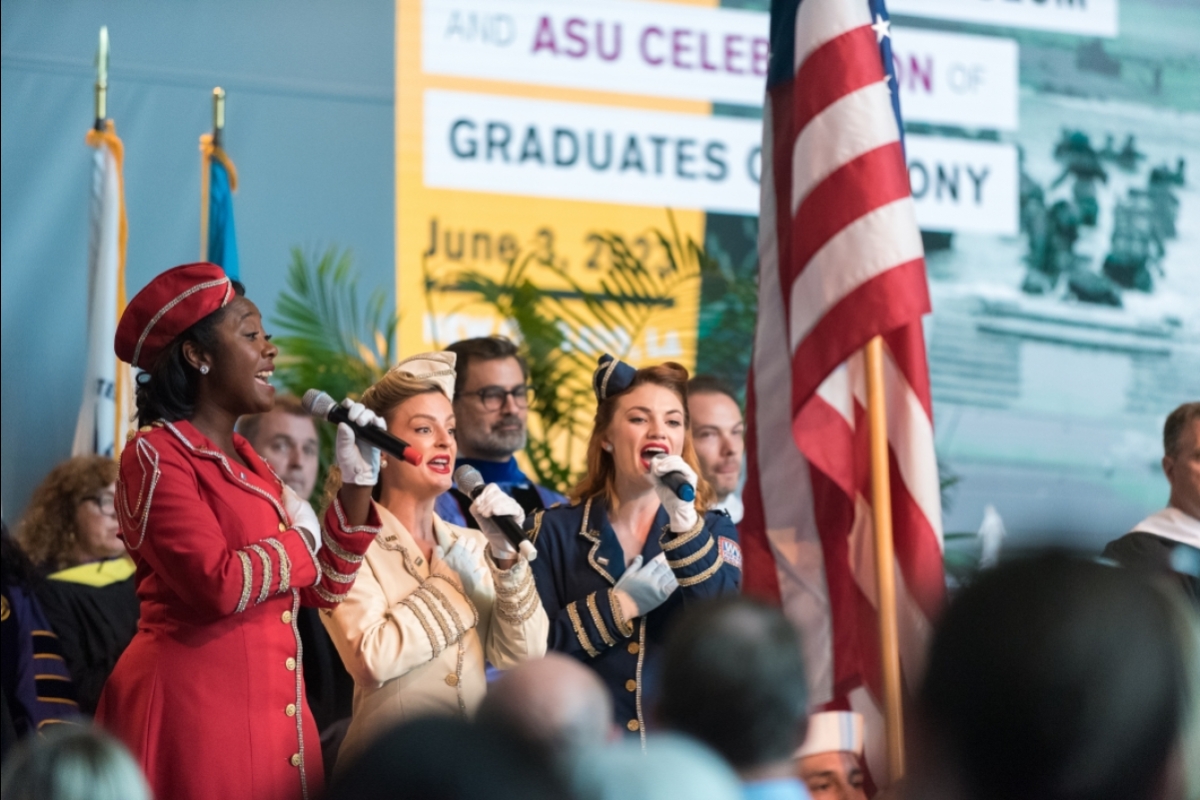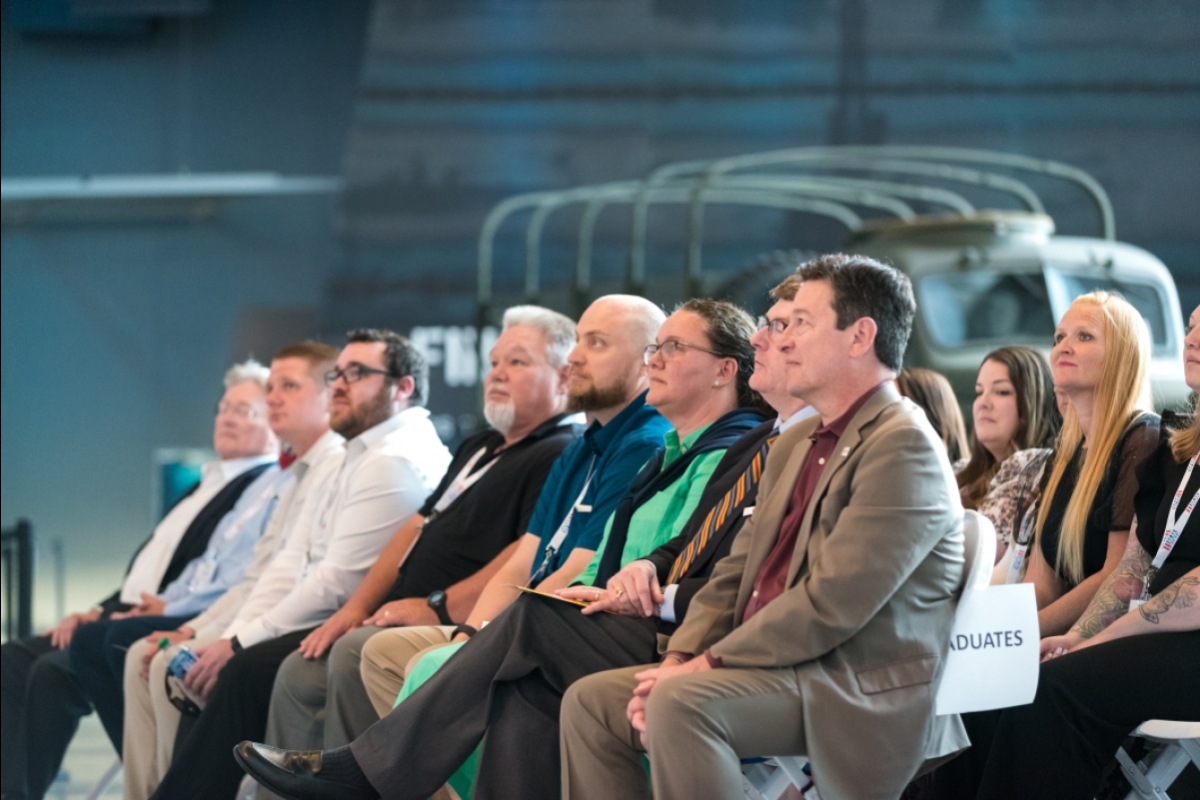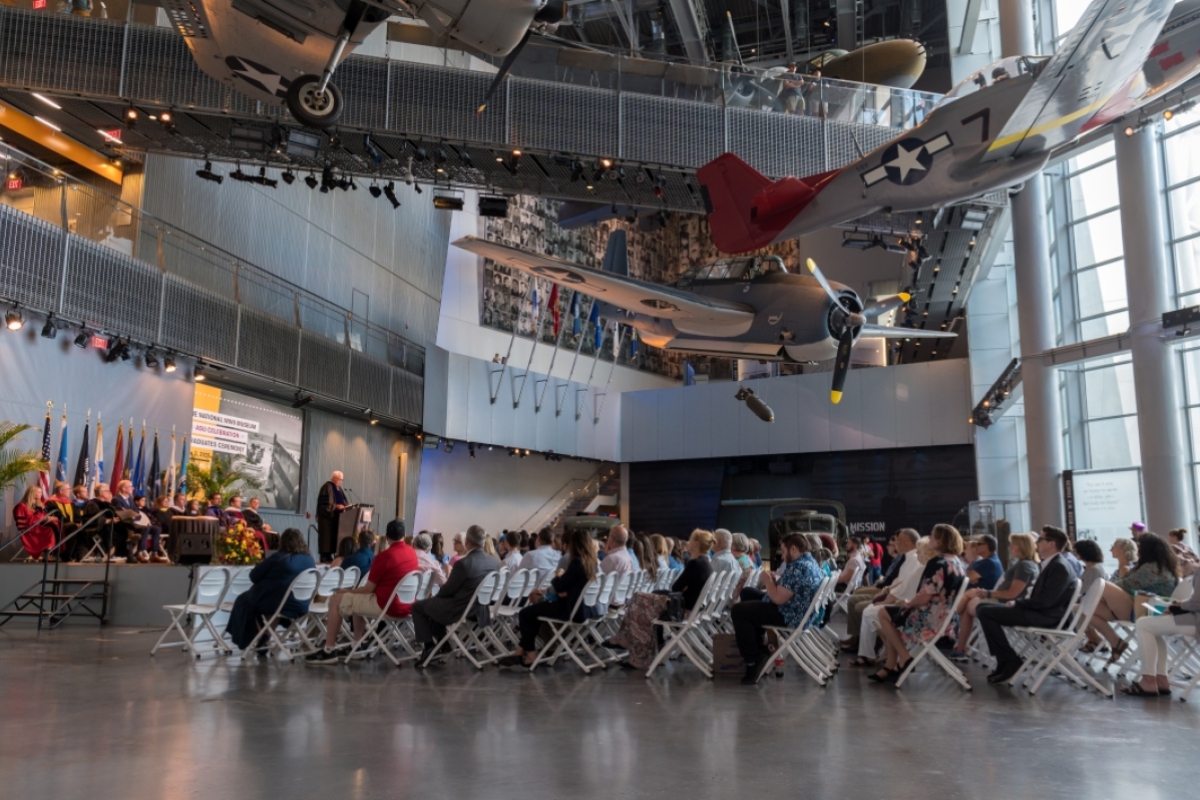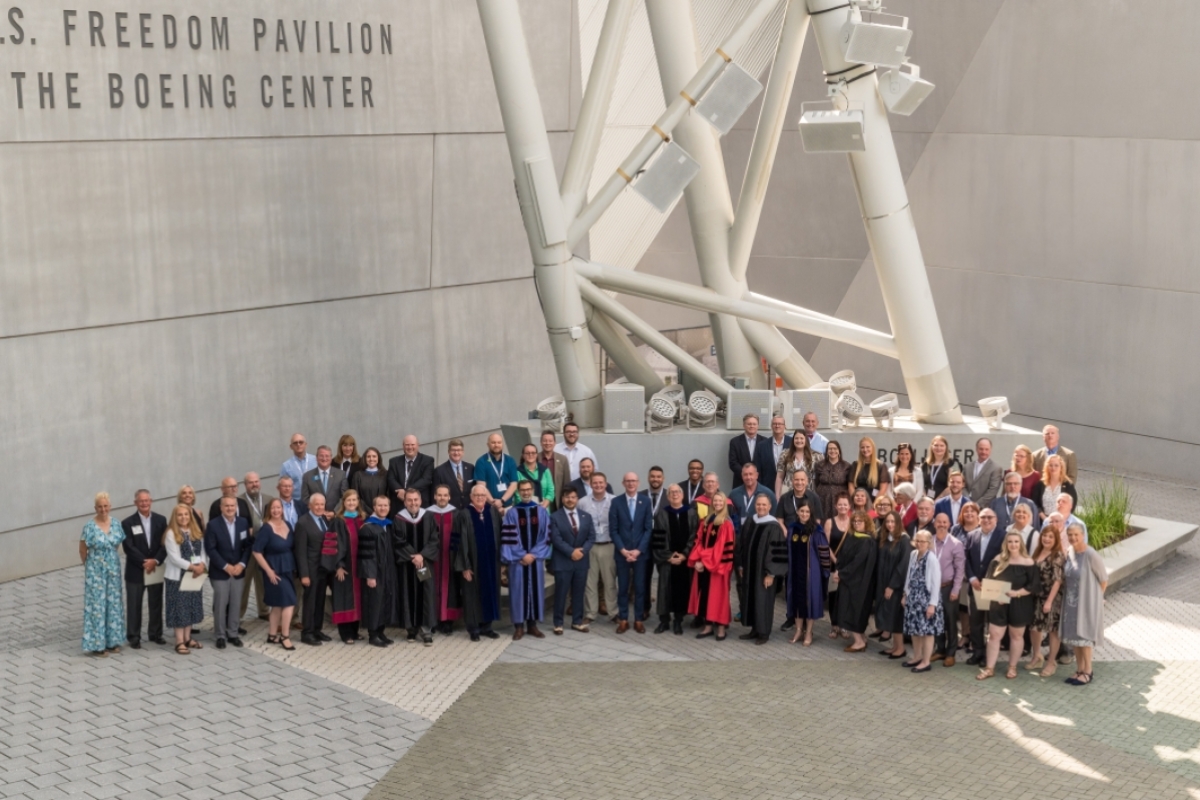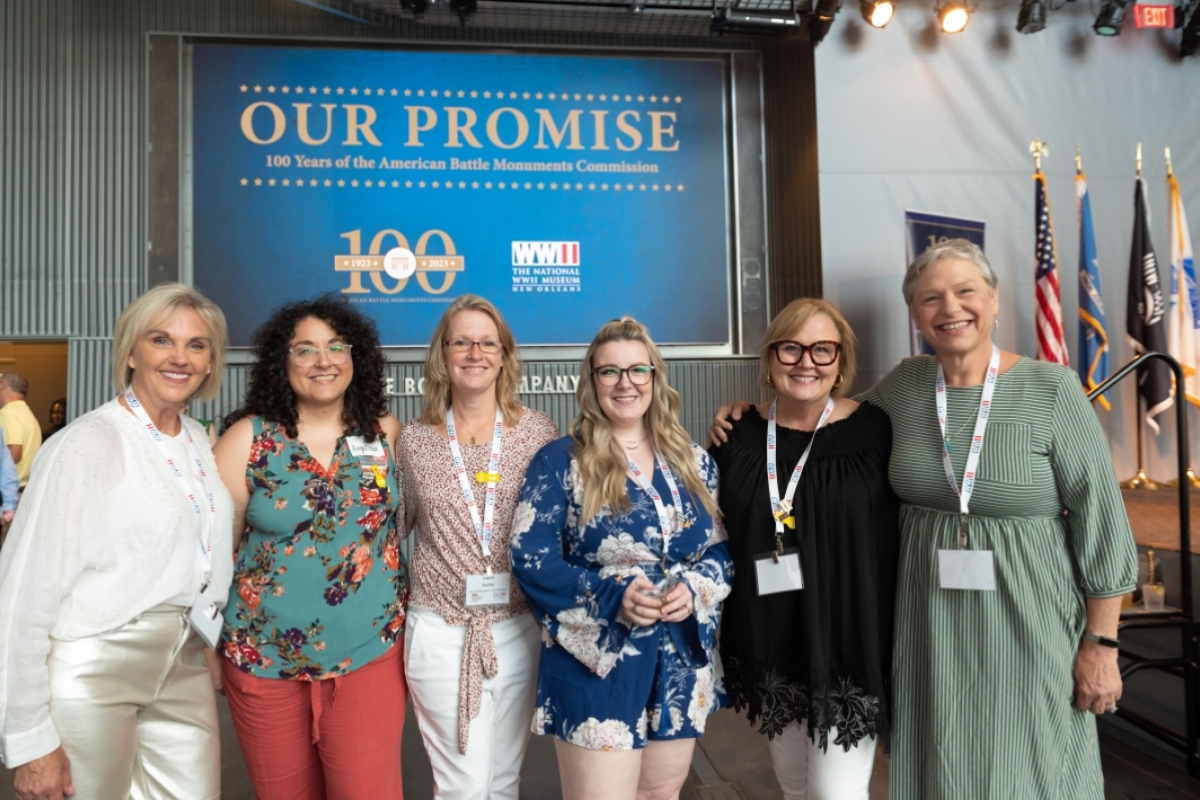ASU WWII studies graduates honored at New Orleans celebration
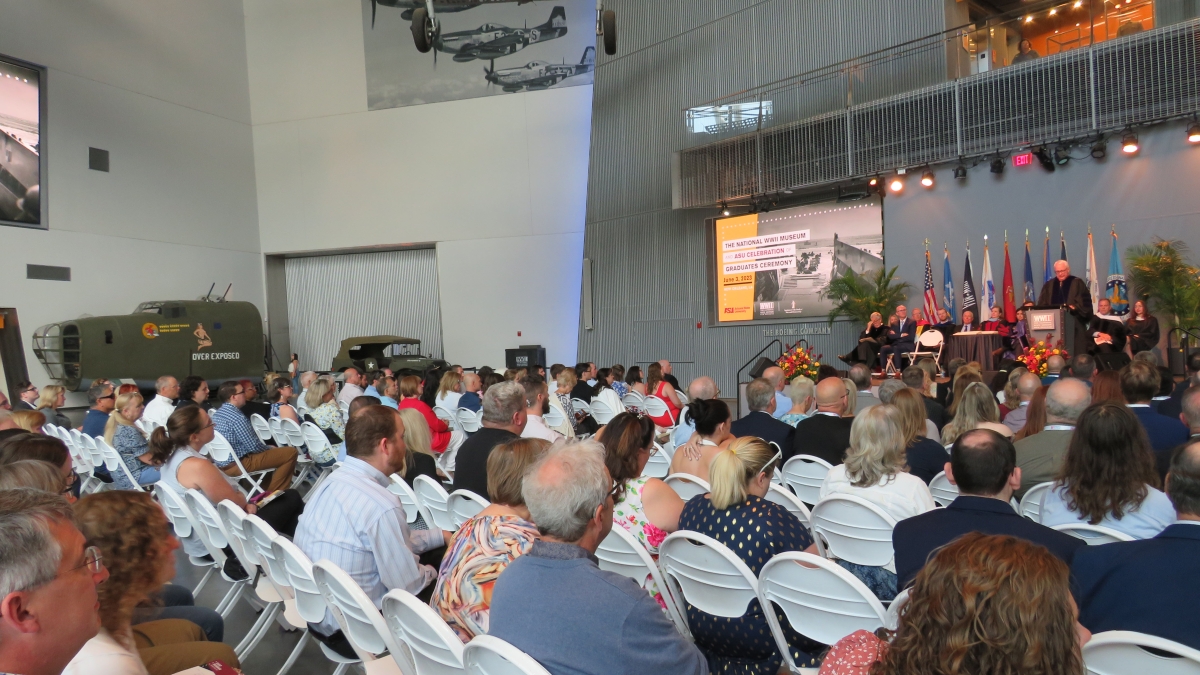
Gordon H. "Nick" Mueller, founding president and CEO emeritus of The National WWII Museum, speaks to a crowd of ASU WWII studies graduates and their guests. Photo courtesy ASU Online
In the U.S. Freedom Pavilion: The Boeing Center at The National WWII Museum, the Victory Belles, a 1940s vocal trio, performed the national anthem as the U.S. Navy presented the colors, and Arizona State University graduates and their guests stood among ground-level tanks, trucks and WWII airplanes. It was the start of a ceremony that honored their dedication to preserving WWII history.
“We are very proud that, along with our partners at Arizona State University, we were able to offer a program that meets your educational needs,” said Stephen Watson, president and CEO of The National WWII Museum. “Your commitment to this program and your commitment to making sure that this important history continues to be relevant to the public, to our country, especially as we enter a time when there are no longer first-person survivors from the war. Thank you for that commitment.”
In 2018, ASU partnered with The National WWII Museum to offer a master's degree in World War II studies from ASU Online. In January 2019, the program welcomed its first cohort of students.
The program celebrated its first graduating class in December 2020, and this June the museum hosted recent program graduates at its New Orleans campus, allowing them to connect in person over their passion for history and celebrate their accomplishments together.
An educational milestone and historial tribute
David Lee Benesh of California was among those in attendance and one of the first graduates of the program. He credited the program with the lasting relationships he made with classmates who shared his interest in this key moment in history. For him, the celebration allowed him to commemorate his accomplishment with his classmates, many of whom he had not yet met in person.
“Although the ASU program was entirely online, the virtual interaction with cohorts resulted in friendships that have continued to this day,” Benesh said. “These relationships have allowed me to continue my learning of World War II through online book club discussions and in person at both ASU and the WWII Museum events.”
The first of its kind, the online program is taught by leading scholars and faculty from ASU and The National WWII Museum's Jenny Craig Institute for the Study of War and Democracy. Students have unique access to museum exhibits, artifacts, oral histories and archival records.
“By combining our academic and archival resources and making the program available fully online, we’ve been able to recruit, train and graduate a new generation of scholars whose successes we’re here to celebrate today,” said Richard Amesbury, director of the School of Historical, Philosophical and Religious Studies.
For several graduates, the journey was personal.
Laura Bailey from North Carolina and Michele LaFerriere from Virginia chose to enroll in the online program because the history of the war is deeply rooted in their family’s history.
“My grandfather was in the 90th Infantry Division in Europe,” Bailey said. “Seeking to understand his experiences, how they formed our family, and how the war shaped our global present is of paramount importance to me as an individual.”
For Bailey, the moment was not only a celebration of her educational milestone; it was a tribute to those who fought in the war that commemorated their sacrifice.
“This celebration is quite important to me and my family simply for the fact of achieving a higher level of education,” she said. “It is also a celebration that pays homage to some dear friends I made over the years who lived and fought in the war experience. Some have since passed, including my grandfather. Yet a couple remain and are incredibly grateful to me and my peers for ensuring their history will not pass with them.”
Three of LaFerriere’s grandparents served during the war, including her grandmother, who was part of the Navy's Women’s Reserve (WAVES). The master’s program enabled her to learn more about their experiences and share the history with her family.
“This celebration means a lot to me and my family for several reasons,” LaFerriere said. “This celebration indirectly honors their service, but also my commitment to honoring their story. Secondly, I went into the program with the desire to prove to myself that I could excel in this program, and so this is also a personal celebration of my hard work and success.”
The power of learning
Gordon H. “Nick” Mueller, President and CEO Emeritus of The National WWII Museum, served as keynote speaker, highlighting the power of learning and the American war experience.
“You know, as you study, that there are inspiring moments that you’ve had from your professors, from books you’ve read, other mentors,” Mueller said. “Something you’re reading suddenly makes sense to you and gives you that surge of confidence in yourself that takes you further forward in your own quest to be all that you can be.”
Beyond learning about military leaders and battles, the stories of ordinary soldiers, sailors, airmen and Americans breathe life and meaning into our history, he added.
“I always say that the purpose of learning is to free people, and that’s liberating for you as individuals as well as for people broadly and in this museum. We learn with both our minds and our hearts,” Mueller said.
Mueller provided perspective on war: It’s not about battles, operations, winning or losing. All are components of war. It’s about the meaning, what was learned and the changes it inspired.
“It’s not just about war but it’s about the experience in World War II, the American experience,” he said. “Why it was fought, how it was won and what it means today, so that future generations can understand the price of peace and be inspired by what they learn.”
Inspired by her parents, who were teens during the war, Mary Ellen Page from Arizona said their stories, music and history were present in her upbringing.
“I started collecting LIFE magazines from World War II in high school and continue to collect artifacts from the war,” Page said.
At 61, she enrolled in the master’s program. Not only did she earn her degree, like Benesh, she also formed an extraordinary bond with those who shared her passion.
“I learned a great deal and saw the history in an entirely new light,” Page said. “Just as importantly, the program introduced me to five women who have become my close friends and are in daily contact. Our first meeting all together will be during this event at the museum. They helped and guided me during this adventure, and there is nothing better than talking, laughing, crying and being history nerds together.”
Page credits the degree program for teaching her new technology, as well as new ways to learn, present information and excel in online education, a step that led her to her career at the Arizona Jewish Historical Society as part of the Holocaust Education team.
“Every day, I use this degree while giving tours and creating educational opportunities for the state’s middle and high school students,” she said.
Graduates, hailing from across the United States, walked across the stage as their names and home states were called out. For some, this was the first time they had the opportunity to do so. For all, it marked the culmination of an experience that shaped their perspective on the historical global conflict.
“Too many ideas have hardened into oppositional identities,” Amesbury said. “It’s become easier to say what we’re against than what we’re for. As a scholar and a lifelong learner, you’re in a position to resist that tendency, to resist conformity of thought, to resist cynicism, to learn from the past as to not to repeat it, to envision new horizons, to encourage our society to think in new and more generative ways about how we might imagine a future together.”
A recording of the Celebration of Graduates can be viewed here.
More Arts, humanities and education

Grand Canyon National Park superintendent visits ASU, shares about efforts to welcome Indigenous voices back into the park
There are 11 tribes who have historic connections to the land and resources in the Grand Canyon National Park. Sadly, when the…
ASU film professor part of 'Cyberpunk' exhibit at Academy Museum in LA
Arizona State University filmmaker Alex Rivera sees cyberpunk as a perfect vehicle to represent the Latino experience.Cyberpunk…

Honoring innovative practices, impact in the field of American Indian studies
American Indian Studies at Arizona State University will host a panel event to celebrate the release of “From the Skin,” a…
